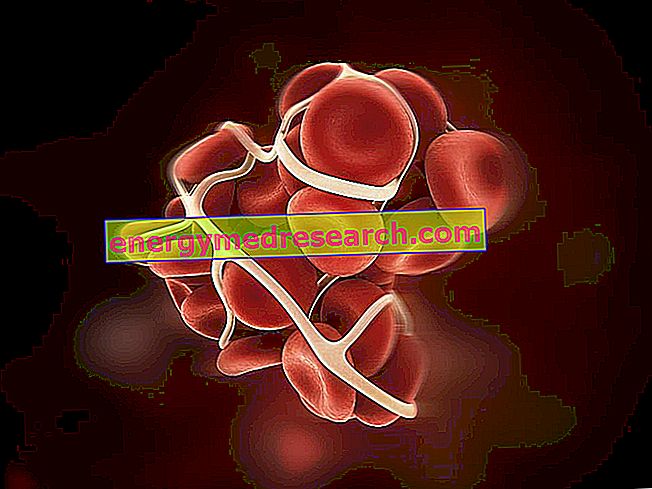ADALAT ® is a drug based on Nifedipine
THERAPEUTIC GROUP: Calcium channel blocker - predominantly vascular effect
IndicationsAction mechanismStudies and clinical effectiveness Usage and dosage instructionsWarnings Pregnancy and lactationInteractionsContraindicationsUndesirable effects

Indications ADALAT ® Nifedipine
ADALAT ® is a drug indicated for the treatment of high blood pressure and hypertensive crises, ischemic heart disease and angina pectoris.
Furthermore, ADALAT ® can also be used in vascular disorders such as those observed in Raynaud's syndrome.
Mechanism of action ADALAT ® Nifedipine
Nifedipine, the active ingredient of ADALAT ® taken orally, is absorbed very quickly and almost totally in the intestine, so as to guarantee a maximum plasma peak between 30 and 60 minutes. Although absorption is very high, bioavailability is generally around 50%, given the first-pass effect characterized by oxidation and the consequent inactivation of the active ingredient. The biologically active altitude acts on the surface of smooth muscle cells, inhibiting the activity of slow calcium channels. These channels are responsible for the massive entry of calcium into the intracellular environment, which is necessary to guarantee all the series of events that are at the basis of the contraction of these cells.
The "muscle relaxant" action occurs mainly at the level of the muscle fibrocells of the coronary arteries and of the peripheral vessels of resistance, while the cardiac muscle and, even less, the skeletal muscle, which presents excitation-contraction mechanisms supported by calcium ions already present in special intracellular organelles. The biological action of nifedipine results in vasodilation and a decrease in peripheral resistance, with a consequent reduction in arterial pressure, cardiac work and oxygen demand. All this justifies the therapeutic actions for which ADALAT is used.
After its action after 2 to 3 hours, nifedipine is eliminated mainly via the kidney.
Studies carried out and clinical efficacy
1 OLMESARTAN MEDOXOMIL ON CARDIOVASCULAR HEALTH
1.NIFEDIPINE: VASCULAR ACTION
The therapeutic efficacy of nifedipine is essentially due to its ability to block the calcium channels expressed on the surface of smooth muscle cells, preventing them from contracting. However, recent molecular studies are further characterizing the biological action of this active ingredient, which seems to be able to inhibit the expression of some factors necessary for the cellular differentiation of smooth muscle cells, thus preventing the muscular thickening of the vessel.
2. EFFECTIVENESS AND SECURITY OF THE NIFEDIPINE
This study, conducted on more than 7500 patients, shows how the administration of nifedipine even at doses of 60 mg / day can guarantee a reduction in cases of heart failure, even by 29%, and the need for coronary angiographies without the appearance of clinically relevant side effects.
3. NIFEDIPINE AND HYPERTENSIVE CRISIS
Hypertensive crisis is a very frequent and dangerous condition for the health of internal organs, characterized by values of systolic blood pressure above 180mmHg or diastolic values above 120mmHg. Nifedipine, taken by sub-lingual administration, is one of the most used drugs in these cases, since it guarantees a good blood pressure return, with high efficacy. Despite the availability of various drugs on the market, scientists from all over the world still question the efficacy and safety of this clinical practice, which should only be used in cases of real need, after considering the potential benefits and related costs.
Method of use and dosage
ADALAT ® 10 mg capsules of nifedipine: for the treatment of high blood pressure it is generally recommended to take 1 capsule 3 times a day.
For the treatment of ischemic heart disease and Raynaud's syndrome the same basic dosages are maintained, while in case of hypertensive crises it could be necessary to take a chewed capsule before being swallowed, even if this practice is still somewhat discussed for possible side effects, even serious ones.
Although the aforementioned dosages are suggested, therapy with ADALAT ® is subject to significant variations in terms of useful and effective dose, which should be customized by the doctor based on individual needs and the severity of the disease in progress.
Taking ADALAT ® should be preferred on an empty stomach, as pharmacokinetic studies have shown that food can increase the time it takes to reach the maximum plasma peak.
IN ANY CASE, BEFORE TAKING ADALAT ® Nifedipine, THE PRESCRIPTION AND CONTROL OF ITS OWN DOCTOR IS NECESSARY.
Warnings ADALAT ® Nifedipine
The administration of ADALAT ® should be carried out with particular attention in case of concomitant administration of antihypertensive drugs or in the case of patients with marked hypotension, as sudden and marked pressure drops could compromise the patient's health.
The monitoring of glycemic levels should be performed in the case of diabetic patients, and in case of any drug-induced hyperglycemia it is appropriate to suspend therapy.
The dosage of ADALAT ® should be reviewed in case of liver failure, given the first-pass effect that halves the biologically effective dose, while the suspension of therapy should be carried out gradually in order to avoid rebound reactions.
Important decreases in pressure, adaptation reactions to the therapy in the initial phase, and the different individual susceptibility to nifedipine, could make the use of machinery and driving of vehicles dangerous.
PREGNANCY AND BREASTFEEDING
Taking ADALAT ® during pregnancy is strongly discouraged. This recommendation is based on several studies showing the series of teratogenic, mutagenic, fetotoxic and embryotoxic effects of nifedipine. The alteration of normal embryonic and fetal development, as well as a direct action of the active ingredient, could also be determined by the impairment of normal uterine blood flow.
Nifedipine is secreted in small part also in breast milk, with effects on the newborn not yet characterized; therefore, it is advisable not to take the drug or to suspend breast-feeding in case of real need.
Interactions
Simultaneous intake of other drugs could alter the normal pharmacokinetic and pharmacodynamic properties of ADALAT ® resulting in a different biological efficacy.
More precisely, the interaction with:
- antihypertensive drugs of various nature, could make the hypotensive effect more marked;
- Rifampicin, could accelerate the metabolism of nifedipine reducing its effectiveness;
- Grapefruit juice, with inhibition of liver enzymes responsible for the metabolism of nifedipine and consequent increase in its action;
- Digoxin, could cause a reduction in its clearance and an increase in plasma levels.
Although not directly tested, it is possible that all other cytochrome inhibitors and inducers, including alcohol, may alter the normal pharmacokinetic properties of nifedipine, compromising their efficacy and safety.
Contraindications ADALAT ® Nifedipine
ADALAT ® is contraindicated in case of hypersensitivity to one of its components, in case of cardiovascular shock and marked aortic stenosis. The immediate-release formula is also contraindicated in cases of angina or recent myocardial infarction.
Undesirable effects - Side effects
The various clinical trials show a good tolerability of the drug, with clinically little relevant and transient adverse reactions. One of the most complained of symptoms is dizziness, muscle cramps, myalgia, cough and gastro-enteric symptoms.
It is however necessary to remember that, although very rare, some adverse reactions - clinically more important - can be carried out in particular categories of patients at risk, or in the case of drug interactions, and determine hyperkalimia, renal insufficiency, impaired liver function and thrombocytopenia.
The drug appears to be well tolerated and the cases of hypersensitivity are rare, which occur mainly with gastro-intestinal and cutaneous symptoms.
Note
ADALAT ® is salable only under medical prescription.



